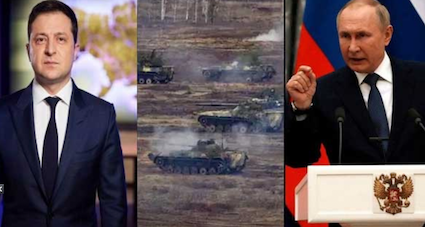Russia welcomed Ukraine’s need for guarantee on its security as the second round of talks between two nations get going but wouldn’t negotiate on the independence of two regions it has recognised recently—Donetsk and Luhansk—and any review of Crimea is non-negotiable.
“Russian President Vladimir Putin clearly stated our position, which our delegation brought to the negotiations with the Ukrainians in Belarus. Crimea is part of Russia”,
Russia’s foreign minister Sergei Lavrov said in an interview to Al Jazeera.
Crimea became a part of Russia after a referendum in 2014 after which a wave of sanctions followed from the US-led West.
Additionally, the Russian foreign minister said, Donetsk and Lugansk People’s Republics should be recognised within the borders of the Donetsk and Lugansk regions in Ukraine. And as far as Crimea is concerned, “that topic is closed.”
Lavrov viewed Ukraine’s willingness for talks, ongoing in Belarus, as a “positive step.” Still, the Ukrainian side, according to Lavrov, is again attempting to drag out the negotiations, just like it did with the first round.
“I think that the Americans do not allow them either”, Lavrov said. “Now no one believes in the independence of Kiev at all”.
The top Russian diplomat pointed at how Zelensky violated the Minsk agreements “in the blink of the eye”, with the West failing to bring the Ukrainian president to reason.
However, the decision to meet for a second round of talks shows the readiness to find a solution to the ongoing conflict, Lavrov said.
Russia is ready to discuss security guarantees with Ukraine, he said.
Lavrov said that the offer for talks isn’t a sign of “capitulation”.
“It is not about the term to be used. We offer an agreement”, Lavrov explained,”It will ensure the legal rights of all peoples who live in Ukraine, which includes all national minorities without exception, their equality”.
The top Russian diplomat referred to the Ukrainian law on indigenous peoples in the country – a law that does not include Russian people.
“These are the kind of things that are already creating the legislative basis for further Russophobic policy and not only Russophobic – against all other national minorities: Hungarians, Romanians, Poles, Bulgarians”, he continued.
According to Lavrov, the ongoing conflict in Ukraine has been artificially created by the West. He also did not rule out that someone was “interested” in Russia becoming mired in this conflict – an approach that Russia’s foreign minister described as “cynical, absolutely neo-colonial philosophical train of thought [that] is characteristic of our Western partners”.
After this conflict is resolved, however, it will be up to the Ukrainian people to decide on their future, Lavrov underlined. But Moscow believes that the decision should be made with regard of the opinion of all peoples that live in Ukraine.
While Kiev has the technological potential to obtain nuclear weapons, it is not something that Russia will allow to happen, Lavrov stressed.
“It is something that President [Vladimir] Putin talked about, our experts also commented on this situation”, Lavrov said. “I can declare that we will not allow this to be done”.
Commenting on the possibility of nuclear war, Lavrov said that such questions should be addressed to US President Joe Biden.
“He said that if they had not taken the path of such sanctions, the only alternative could be World War III “, the Russian foreign minister noted.
The conflict in Ukraine, according to Lavrov, is something that Russia aims to put an end to with its military operation, with the goal to “demilitarise and denazify” the neighbouring country. According to the Russian foreign minister, Ukraine should undergo a similar procedure of denazification as Nazi Germany did back in the 20th century. In regard to Germany, Lavrov also said that Moscow is “amazed” with its officials’ comments on Ukraine and Berlin’s supply of weapons to Ukraine.
“My colleague Annalena Burbock said that, given the historical responsibility that Germany is aware of, her country simply has an obligation to supply weapons to Ukraine”, Lavrov recalled. “How should we understand this? The historical guilt and awareness of historical guilt that requires Germany to support neo-Nazis? This creates some strange associations”.
The Russian Armed Forces, according to the Kremlin, are targeting Ukrainian military infrastructure exclusively, and do not pose a threat to civilians. Lavrov stressed that the Russian military is doing “everything” in order to prevent serious civilian casualties. Moscow also underlined that it has no plans to occupy Ukraine.
The military operation prompted a wave of anti-Russian sanctions from the Western countries that have targeted Russia’s financial sector, its businesses, cultural organisations, and state-run media outlets. Particularly, the sanctions have also hit Russia’s gas pipeline Nord Stream 2 – something that, according to the Russian foreign minister, has shown that Germany has an “absolutely subordinate and dependent place” on the world stage.
Lavrov also addressed the attempts to “expel” Russia from the Council of Europe, noting that there is no such mechanism that could allow Russia to be stripped of its permanent membership in the body.
Lavrov estimated the Western sanctions as an attempt to create a new “Iron Curtain” for Russia. He blasted the anti-Russian measures taken by the West as a return to the “gangster, wild capitalism” of the times of the “gold rush”. However, he asserted that Moscow will find opportunities to develop despite these attempts, as it is able to withstand any kind of political or economic pressure.
“If the West decided so, then I assure you, we will find an opportunity to continue to live, develop, and we won’t even worry too much about what our Western partners have done, once again proving their absolute unreliability and complete inability to negotiate”, the diplomat said.


